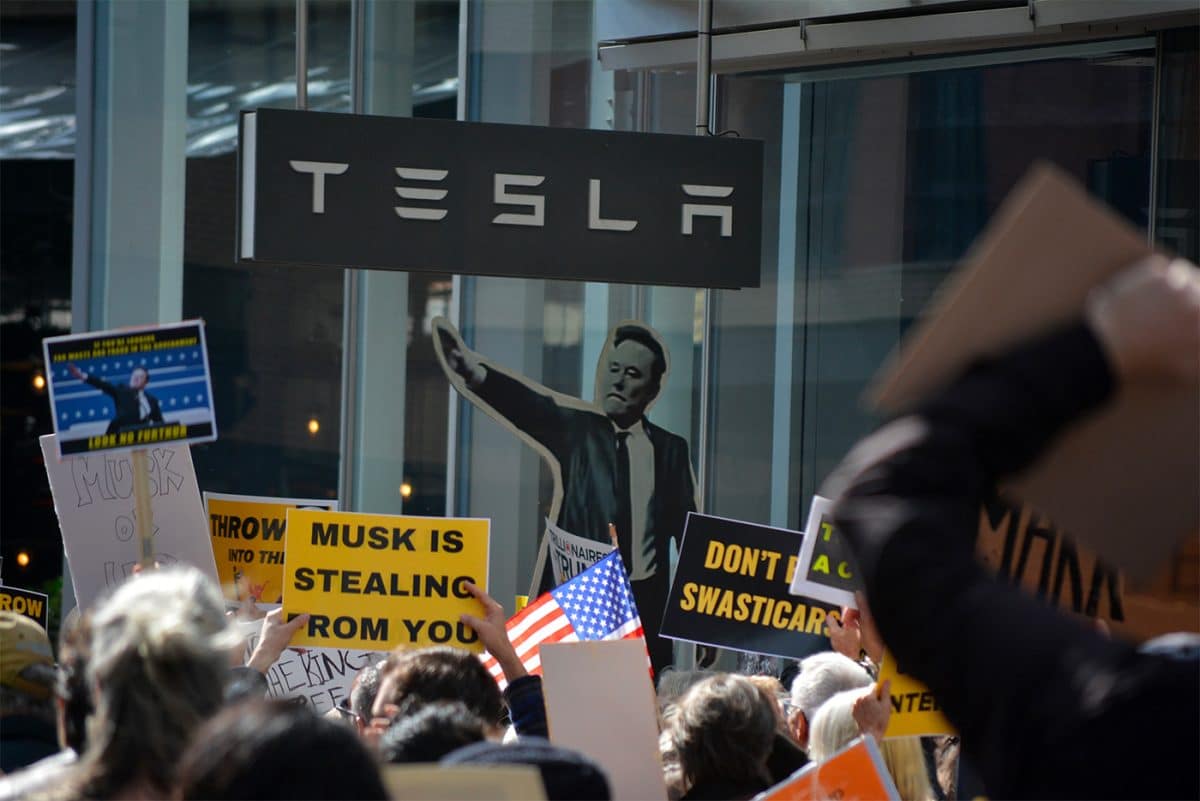#BoycottUSA, a mass movement, a left-wing movement?
Survey on the image of the United States among the French and the boycott of American products after two months of the Trump presidency
At a time when the hashtag #BoycottUSA is flourishing on social networks, what impact has the new Trump administration had on the image of the United States? Have the US presidency’s recent announcements in a number of areas – tariffs, the war in Ukraine, corporate EID policy – altered the ‘US brand’ in the eyes of the French as a destination as well as the origin of a whole range of everyday products and services? As a close observer of Franco-American relations, the news website NYC.eu commissioned Ifop to carry out a major survey showing a historic deterioration in the image of the United States in the eyes of the French and widespread support for the movement to boycott American brands. Carried out among a representative sample of 1,000 French people, the study also tends to show that the current boycott is not just a temporary emotional reaction, particularly for products that are easily replaceable or politically marked, such as the brands of Elon Musk’s group (Tesla, X).
TO QUOTE THIS STUDY, USE AT LEAST THE FOLLOWING WORDING:
Ifop study for NYC.eu conducted by online self-administered questionnaire from 14 to 17 March 2025 among a representative national sample of 1,000 people, representative of the French population aged 18 and over.
An unprecedented collapse in the image of the United States among the French..
“The Trump effect: US approval ratings among the French plummet to their lowest level in 40 years
After just two months of the Trump presidency, America’s approval rating among the French has fallen to 25%, a drop of 40 points compared to the last measure taken in 2010 (65%) during the2nd year of Barack Obama’s term in office. The image of the United States among the French public has thus fallen to its lowest level in 40 years, even beating the unpopularity records measured under George W. Bush in the aftermath of the Iraq crisis in 2003, a crisis that severely damaged Franco-American relations, but not to the point where the United States’ approval rating fell below 30% (e.g. 31% in 2005, 30% in 2007).
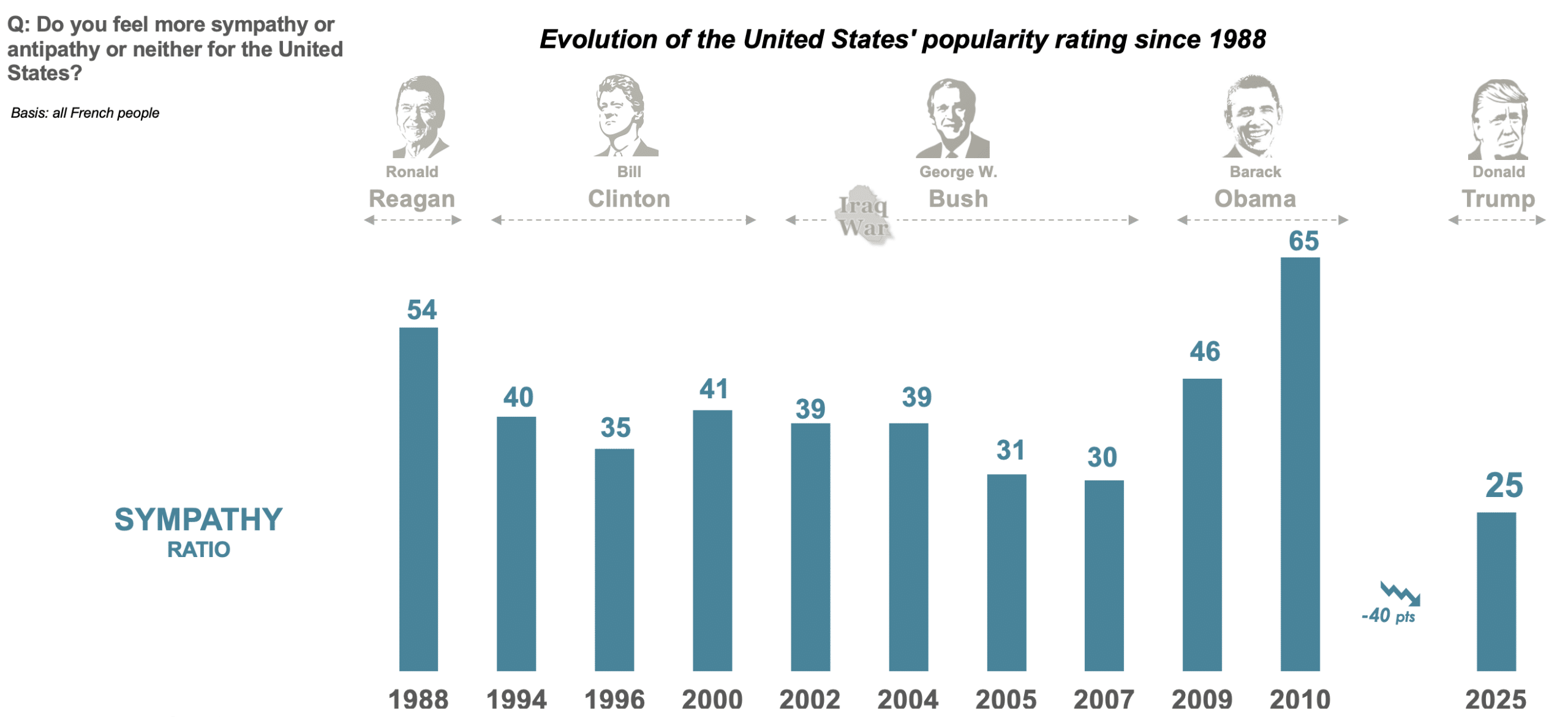
An analysis of the profile of ‘fans’ of this Trumpist America obviously highlights a gender gap (30% among men, compared with 21% among women) – like all the surveys carried out on the new President on both sides of the Atlantic – but also the extent to which the French view of this country is now structured by their ideological sensibilities. Indeed, their sympathy for the United States is correlated above all with their political position, rising from 15% among French people on the left to more than double among those on the right (33%) and extreme right (36%), with the highest levels of sympathy among Lepéniste supporters (37%).
The feeling that French and American societies do not share the same values is twice as high today as it was twenty years ago
This deterioration in the image of America goes hand in hand with a growing sense of a gulf between French and American values: only a quarter of French people (26%) now feel that the two countries are ‘close’ in terms of values, compared with almost half twenty years ago (49% in 2004). Conversely, the feeling of “disconnection” with current American society is now shared by almost two-thirds of French people (63%, compared with 48% in 2004), particularly in the most educated segments of the population (e.g. 71% of managers) and those furthest to the left of the political spectrum (76% of NFP voters, 90% of ecologist supporters).
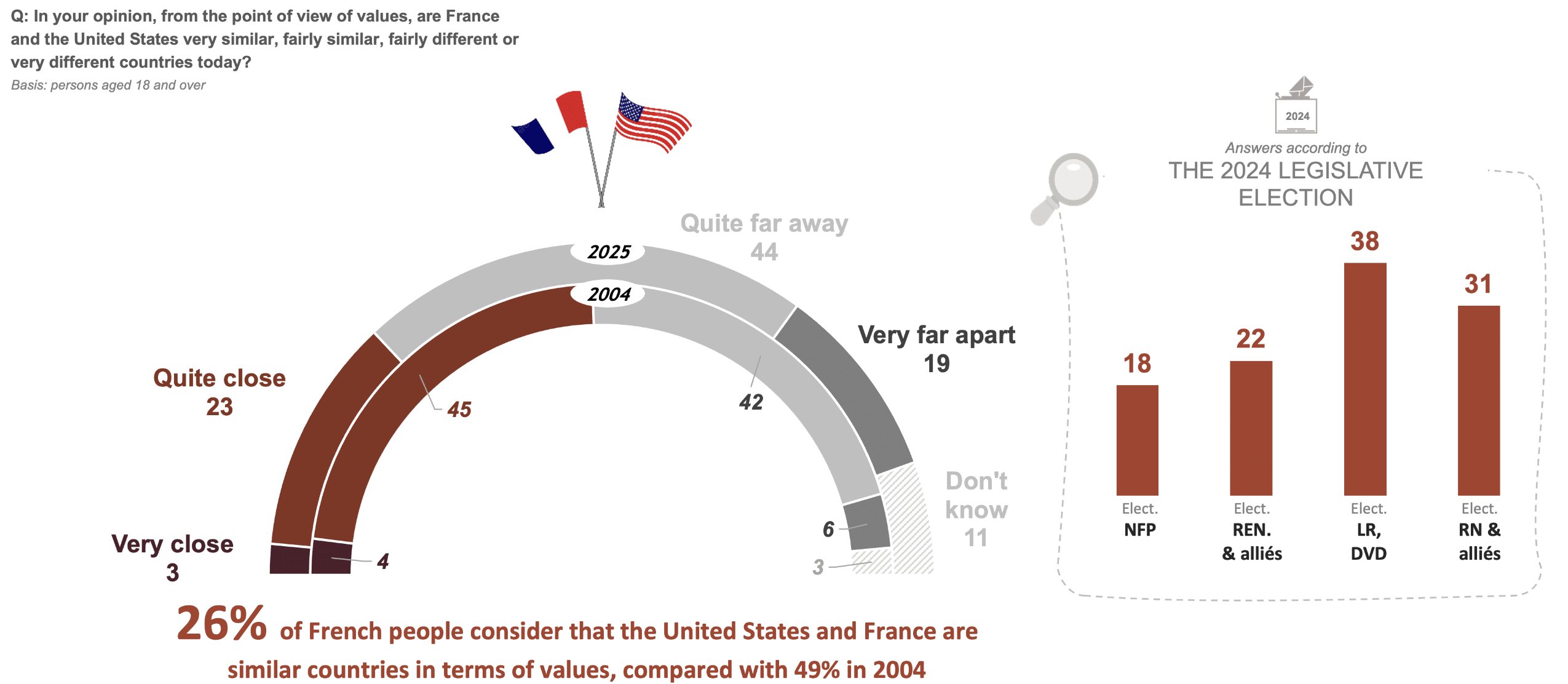
II – … accompanied by a spectacular fall in the attractiveness of the “US destination
The historic decline in the image of the United States among the French has had a significant impact on its appeal in general, and as a tourist destination in particular.
The end of the “American Dream”? Trump’s America has never been such an undreamt-of place for French people to study or work
The attractiveness of the United States as a place to study or work is half what it was fifteen years ago: less than a quarter of French people would now like to go to the United States to study (22%, compared with 48% in 2010) or to work (20%, compared with 37% in 2010), the lowest levels in the last twenty-five years! Even during the Iraq crisis in 2000, intentions to study or work in the USA were higher. The attractiveness of the USA as a place to live for the long term has also deteriorated, but less sharply (down 8 points since 2010, to 22%), with the American Dream retaining a certain resonance among business leaders (32%), the under-50s and young men (38%).
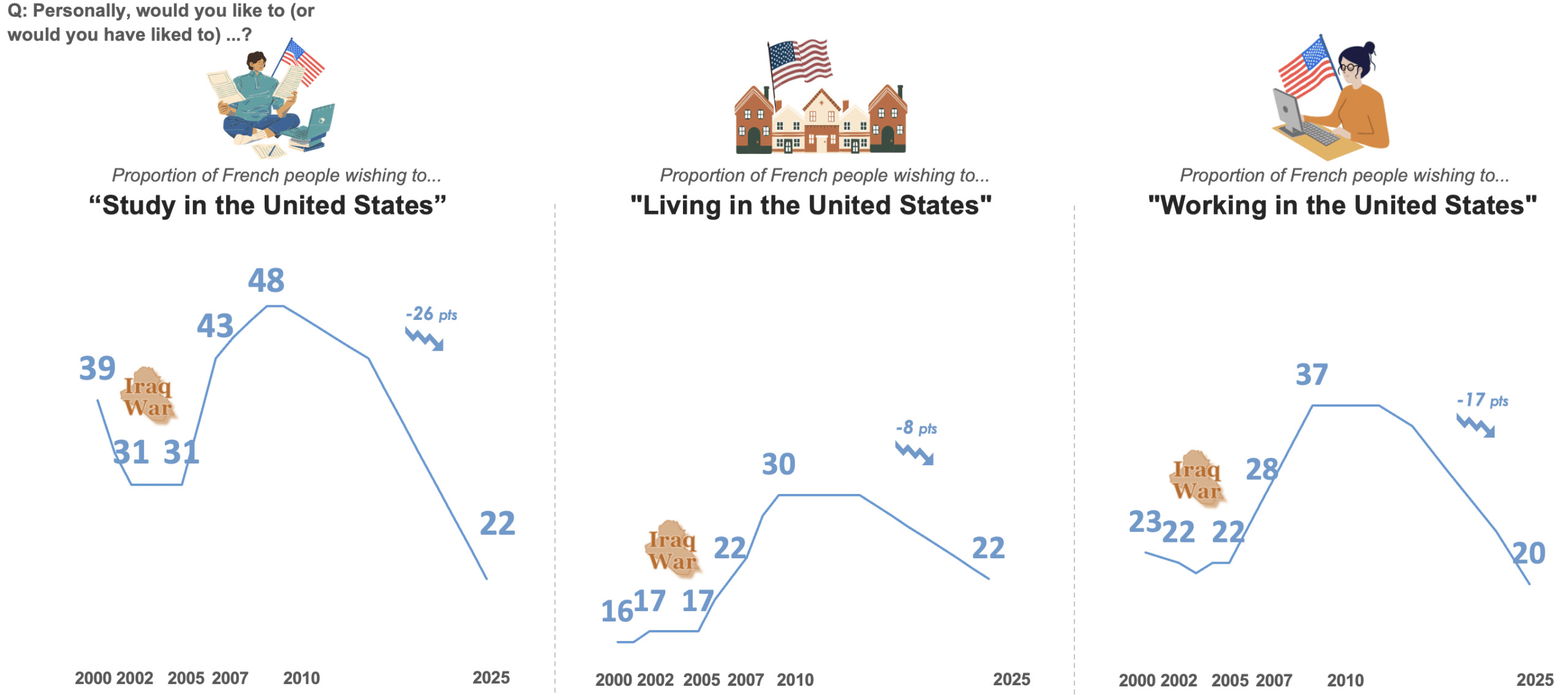
The tourist potential of the USA is dropping slightly among the French, who are on the other hand much more inclined to visit their Canadian neighbours
Against the backdrop of current international tensions, the USA’s potential as a tourist destination is being eroded, while other North American destinations are enjoying renewed favour in the hearts of the French. In fact, the proportion of French people who would like to visit the USA is falling significantly (-4 points compared to 2022, to 51%), particularly among women (-7 points) and the most highly educated (-7 to -9 points) and most affluent sections of the population (-3 points). Conversely, the ‘desire for America’ is increasing among the French people least likely to be able to leave, such as blue-collar workers (up 11 points) and those in the lowest income brackets (up 3 points).
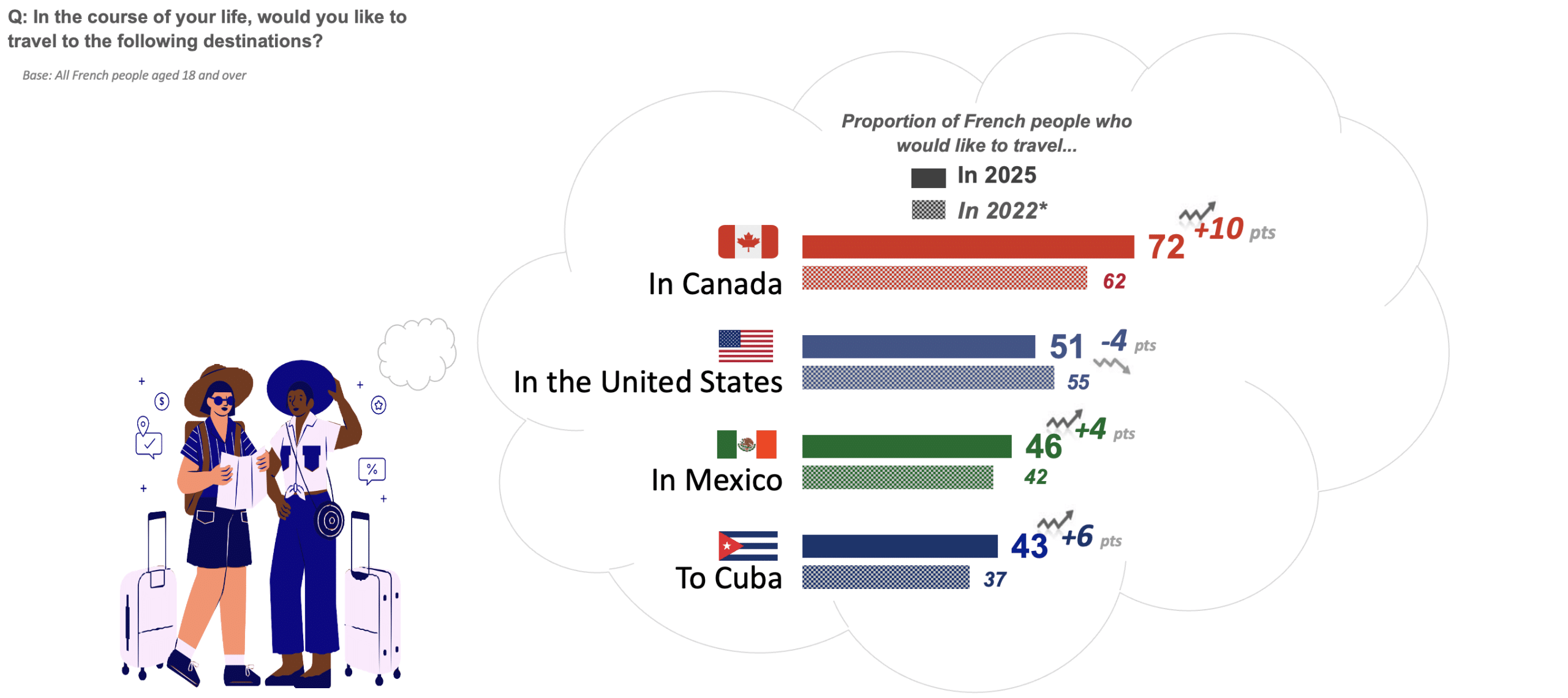
Data on other countries tends to show a phenomenon of substitution in favour of the USA’s neighbours, first and foremost Canada, which is enjoying renewed sympathy because of the threats of annexation and colossal customs tariffs to which it is subject, but also as a North American alternative more in tune with the progressive values of Europeans. In fact, the most notable increase is for Canada, whose tourism potential has jumped by 10 points among the French (72%, compared with 62% in 2022), but there is also a clear upward trend for “hotter” destinations such as Mexico (up 4 points to 46%) and Cuba (up 6 points to 43%).
However, some progressive cities such as New York seem to be escaping some of the growing opprobrium affecting Trumpist America
Despite the overall deterioration in the image of the United States, New York’s attractiveness remains significant, as if the image of the ‘Big Apple’ were somewhat dissociated from the rest of the country. In fact, New York still has a certain appeal: 62% of French people would like to spend a short holiday there, 28% would like to stay for at least a year, and 16% would consider living there permanently. This ‘New York exception’ is probably due to the dissociation that exists in the French imagination between progressive, cosmopolitan American metropolises – such as New York and San Francisco – and the American heartland, which is perceived as hostile to European values.
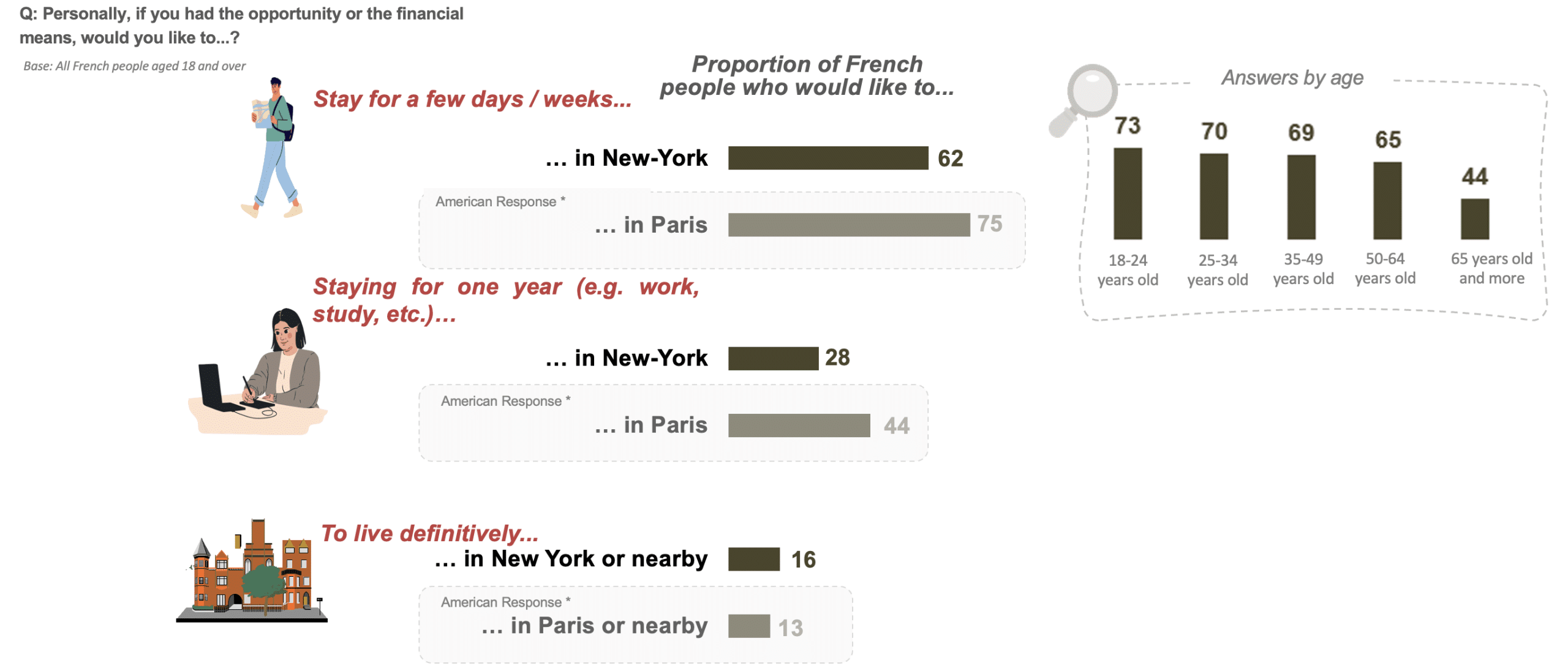
The rise of the #BoycottUSA movement can only be understood in the light of this erosion of American soft power, which has never been such an unattractive model for the French.
III – … And widespread support for boycotting American brands, particularly those that are politically tainted or for which alternatives exist
Calls for a boycott of American products to protest against Donald Trump’s policies are supported by a clear majority of French people
Calls for a boycott of American products, which arose in the wake of threats to raise tariffs and the verbal sparring between the American and Ukrainian presidents in the Oval Office, are widely supported in France: 62% of French people support these calls for a boycott of American companies. And while the left appears to be spearheading this movement (72% support), the boycott of American products also appeals to a large majority of centre-right voters (65%). Only Lepéniste voters really appear to be on the back foot, with only 49% support among RN voters in the last legislative elections.
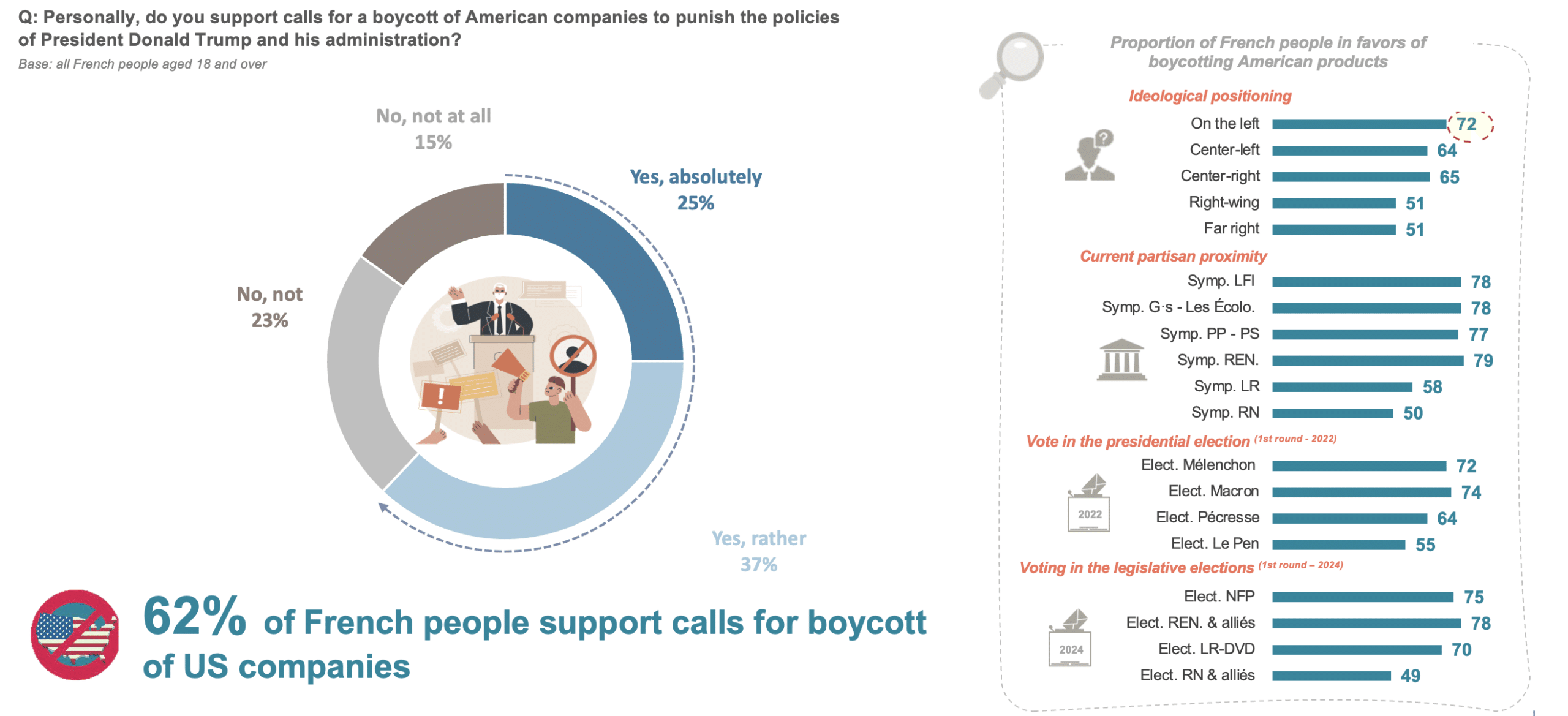
An analysis of the profile of French people supporting this movement shows that senior citizens are overwhelmingly in favour of this boycott (81% of the over-65s, compared with 58% of GenZ voters), as are other categories with generally high purchasing power (e.g. managers, higher education graduates, incomes in excess of €2,400 per person). The fact is, this membership of the most financially well-off categories poses a serious threat to American companies.
Today, one French person in three boycotts at least one American product, with the companies most affected being soft drinks, fast food and Elon Musk’s brands
Nearly one in three French people (32%) say they are currently boycotting products from a particular brand or company, a similar proportion to that recently measured in Sweden: a Vérian/SVT poll showed that 29% of Swedes chose not to buy American products last month as a political protest. While the boycott has long had little place in the French repertoire of political action – particularly compared with predominantly Protestant cultural areas such as North America and Scandinavia – it does seem to have become somewhat institutionalised in France as a legitimate form of civic expression.
An analysis of the responses to an open-ended question – in which respondents were asked to name the brands they were boycotting spontaneously – tends to show that the sectors most affected by boycotts are those where products are most easily substituted by non-American alternatives. For example, the most boycotted brand today is a soft drink, Coca-Cola (48%), ahead of fast-food brands MacDonald’s (44%), Starbucks (15%) and KFC (12%). The only two non-food brands to be significantly boycotted were Tesla (19%) and X (10%), two companies owned by Elon Musk, whose image has been seriously damaged by his controversial statements and his political involvement with Donald Trump.
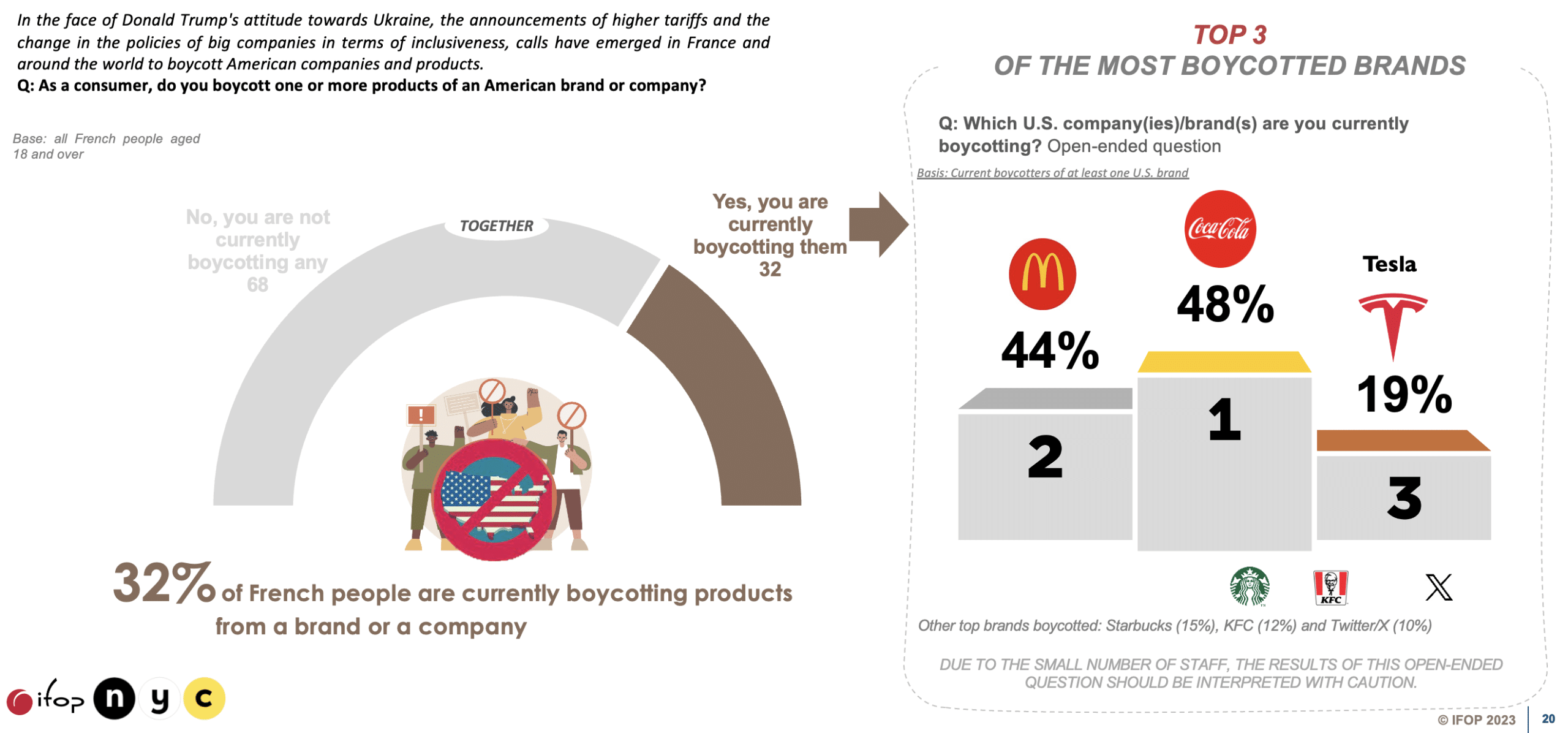
Analysis of the results suggests that the boycott of US brands is a form of committed consumption that is driven by support for progressive values. The proportion of boycotters is particularly high among French people who say they are very progressive on social issues (55%, compared with 19% among those who say they are “very conservative”), just as it is much higher among people who are very feminist (51%) than among non-feminists (27%). Generally speaking, the practice of boycotting American brands appears to be a marker of the left, and particularly as an indicator of societal progressivism.
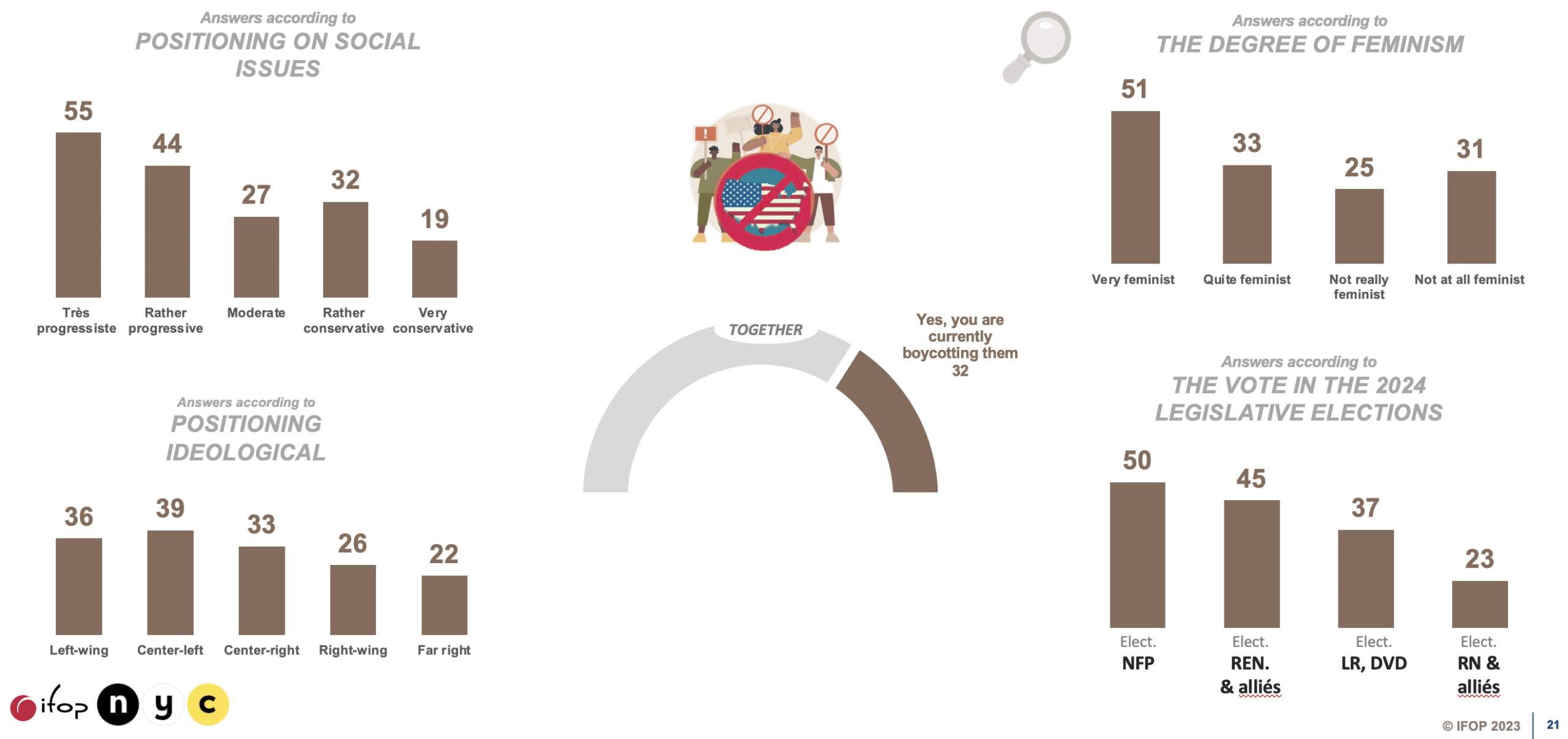
In any case, this ranking reveals that boycotters primarily target brands that are emblematic of American mass consumption (soda, fast food), but also those directly associated with personalities close to Donald Trump, such as Tesla’s Elon Musk.
This boycott of American products is driven by anti-Trumpism, but also by other motives, such as economic patriotism on the right and the defence of societal progress on the left
An analysis of the motivations behind the anti-American boycott shows that it is a hybrid movement, combining political opposition to Trump, the defence of societal progressivism and the affirmation of a national or European economic preference. While protest against corporate support for Trump (62%) and against his domestic (61%) or foreign (61%) policies are the main reasons given, other dimensions emerge with comparable force. Support for French businesses and jobs tops the list (62%), particularly among right-wing voters (84% among LR-DVD), as does the defence of European economic interests (56%). Protesting against the DEI policies of US companies (44%) is a secondary but significant motive among left-wing voters (52% for NFP). This multifactorial dimension undoubtedly plays a part in its ability to mobilise very opposed electorates.
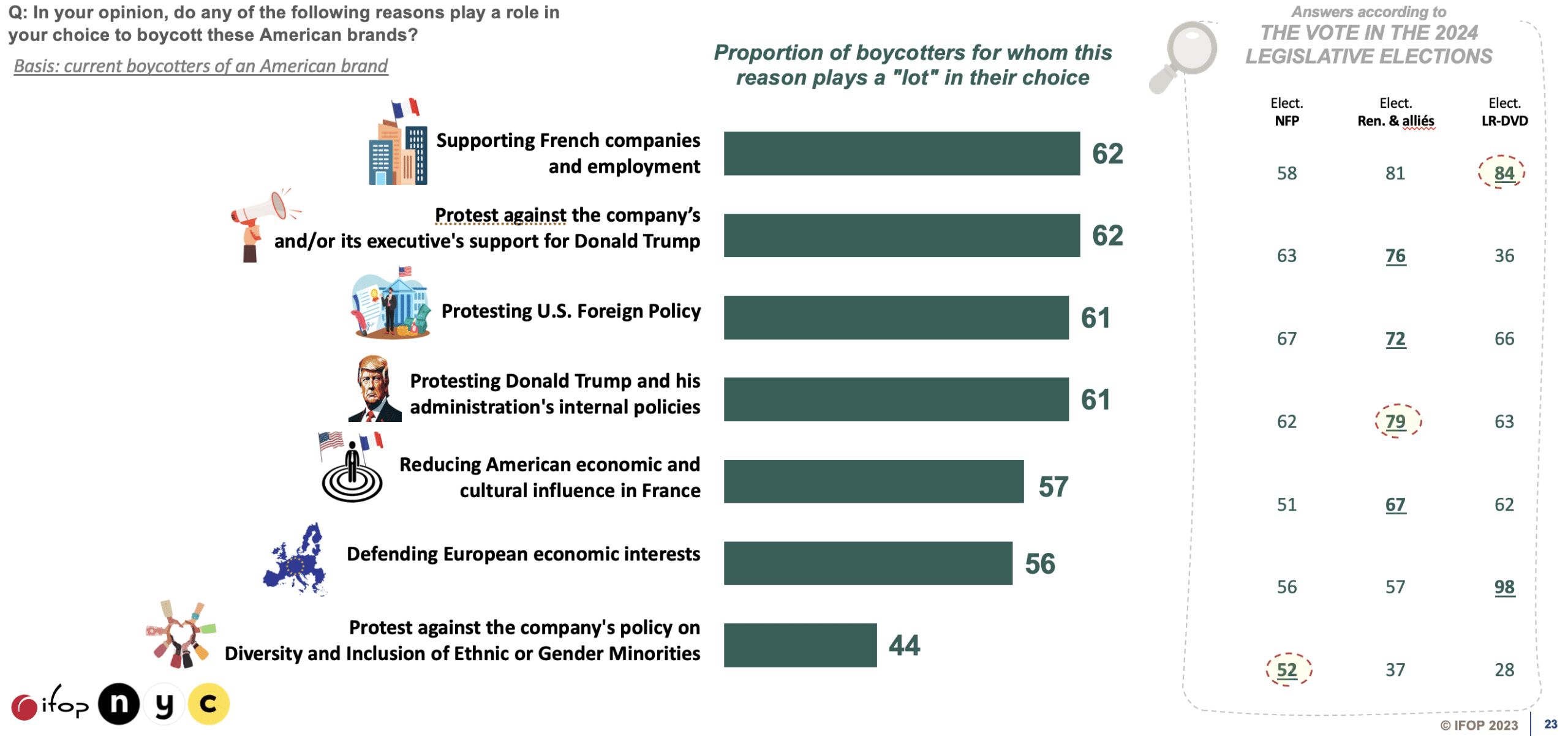
All sectors are at risk from the boycott, but the most threatened are those most easily replaced by non-American alternatives
All American sectors are potentially affected by the boycott, but with intensities that depend mainly on two factors: the American visibility of the brand and the existence of credible alternatives. The sectors most at risk (61% for automobiles, 55% for soft drinks, 53% for sports shoes, 52% for clothing) share these two characteristics: clear identification in the USA and the existence of European or Asian alternatives. Conversely, sectors where alternatives are more limited, such as professional software (44%) or social networks (41%), show more moderate rates of boycott intention.
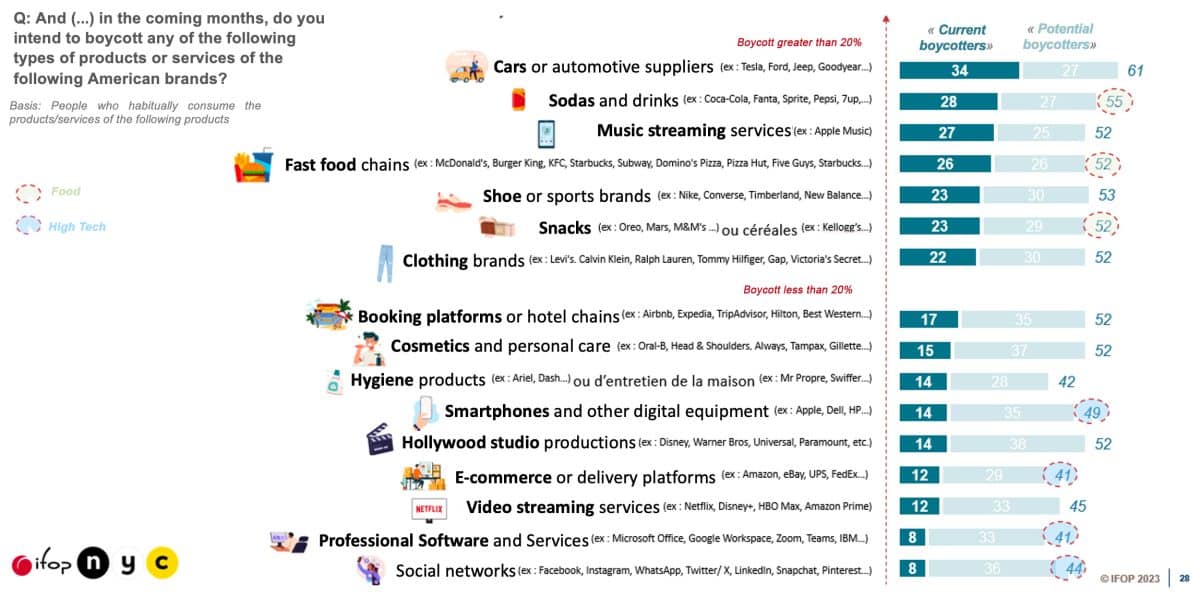
This logic explains why American car brands feature prominently in our TOP 20 most threatened brands: Tesla (47%), Jeep (41%) and Ford (37%) are easily substitutable by European or Asian alternatives. Similarly, clothing brands (Calvin Klein, Tommy Hilfiger, Ralph Lauren, Gap) and footwear brands (Timberland) face a high risk due to a highly competitive market. On the other hand, the French are much less motivated by the idea of abandoning their habits with the American giants of new technologies – such as smartphones, streaming or social networks – to which they are often highly dependent.
“Elon go home”: the Musk empire at the forefront of the anti-American boycott
A detailed analysis of the brands most at risk of boycott clearly shows Elon Musk’s entrepreneurial empire to be the main target of the #BoycottUSA movement: Tesla topping the list (47%), followed by Twitter/X in third place (40%).
Elon Musk’s brands are paying for the outbursts of a provocative boss, known for his explicit support for Donald Trump, his controversial stances on social networks and his open support for far-right movements in Europe. More recently, his ‘Nazi’ salute at Donald Trump’s inauguration and his appointment as head of the Department for Government Efficiency (Doge) have contributed to a collapse in his public image. In any case, this data is consistent with the fall in Tesla car sales (45% in Europe in January 2025 compared with January 2024) in an electric car market that is nevertheless on the rise.
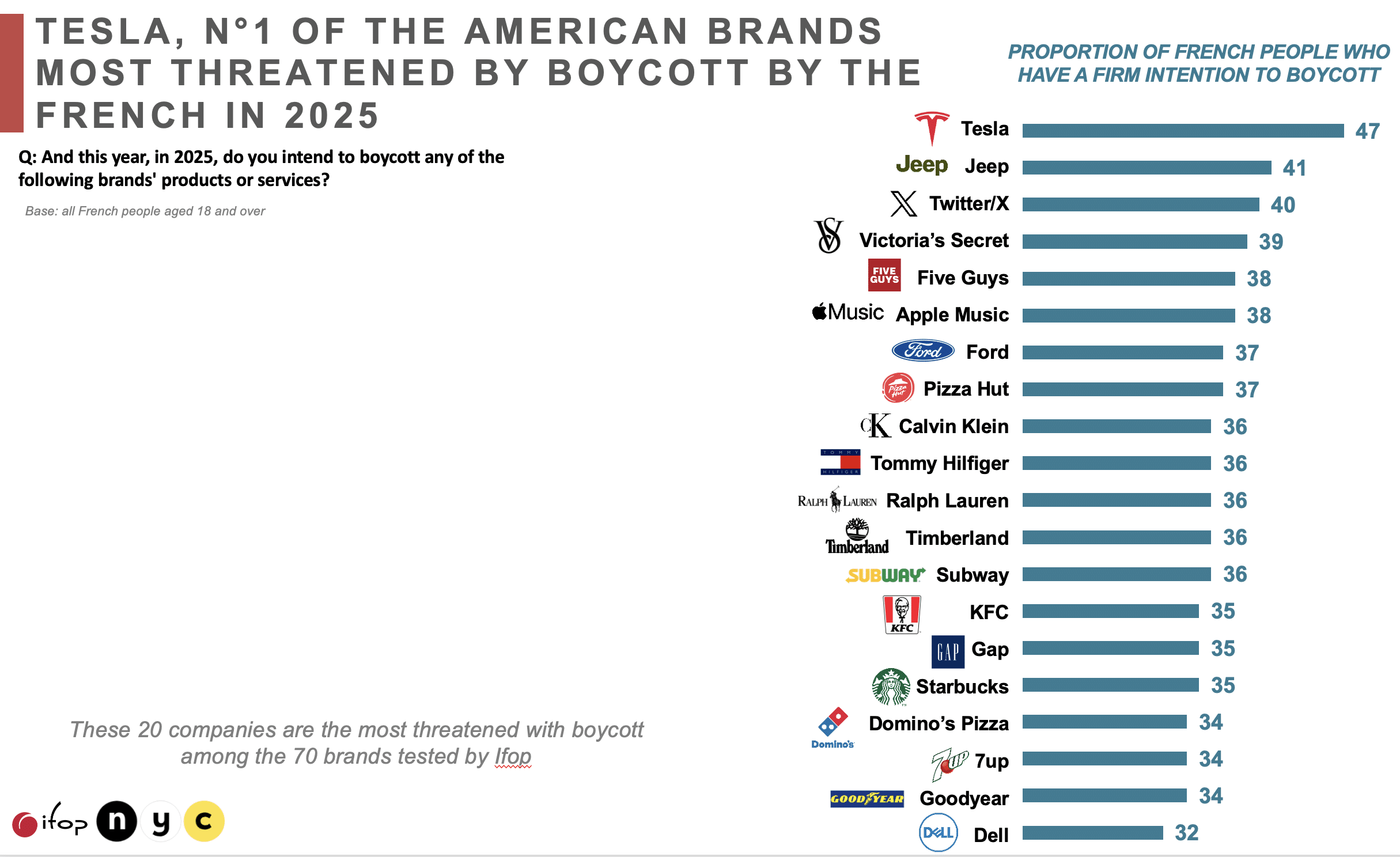
A socio-demographic analysis of potential Tesla boycotters reveals a massive over-representation of senior citizens (70% of those aged 65 and over) and university graduates (55%), while X/Twitter is more popular with ecologists (63%) and graduates (49% among those with a first university degree). This structure of the anti-Musk boycott presents a major risk for these companies, since it affects their core target groups: the well-off, educated and technophile for Tesla, and opinion leaders and content creators for X/Twitter.
Finally, the study also confirms the extent of the rejection of the American food model in France. Among the sectors most threatened by boycott are soft drinks (55%), fast food chains (52%) and American snacks (52%). This trend is reflected in the TOP 20 brands most threatened by this movement, which includes Coca-Cola as well as many fast food chains: Five Guys (38%), Pizza Hut (37%), Subway (36%), KFC (35%), Starbucks (35%) and Domino’s Pizza (34%). And politically, the fast-food boycott is very popular with environmentalists and left-wing voters, for whom it also combines environmental concerns with criticism of industrial food.
The view of François Kraus of Ifop, Director of the Politics & News Unit
This survey sheds light on a phenomenon that is unprecedented in the history of Franco-American relations: the emergence of a broad boycott movement with unprecedented sociological drivers: a support base that transcends political divides, a diversity of motivations and a strong mobilisation of senior citizens and the well-off. This generational dimension of the boycott is also its most worrying feature for American brands. Unlike traditional boycott movements, which are often led by young people but limited in time, this one mobilises senior citizens and the upper socio-professional categories on a massive scale, with a greater financial impact. This generational structure, combined with the breadth of support among the general public, suggests that this movement will be more than just a flash in the pan for French consumers, particularly for products associated with the Trump administration or which are easy to replace.
Ifop survey for NYC.eu conducted by online self-administered questionnaire from 14 to 17 March 2025 among a representative national sample of 1,000 people, representative of the French population aged 18 and over.
